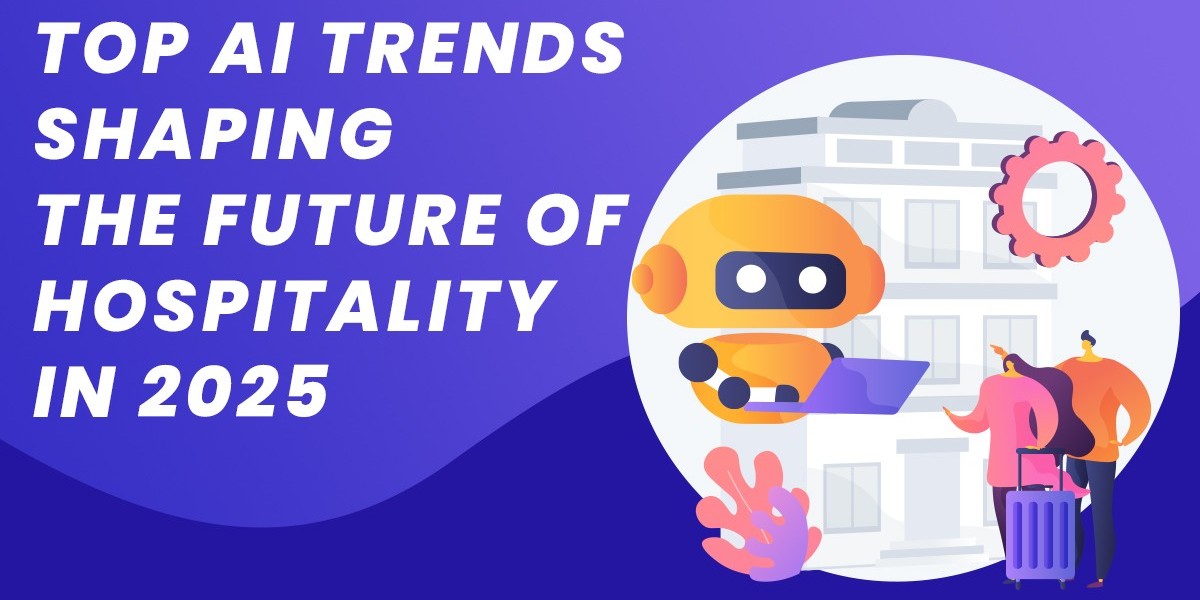Artificial Intelligence (AI) is revolutionizing the hospitality industry, creating a seamless experience for both guests and hotel management. As we look toward 2025, AI in hospitality is expected to bring even greater advancements, setting new benchmarks for personalization, operational efficiency, and sustainability.
In this article, we are going to explore the top AI trends that are set to shape the future of hospitality by 2025, highlighting key advancements in guest experience, predictive maintenance operational efficiency, and sustainability.
Top 8 AI Trends Transforming the Future of Hospitality in 2025
1. AI-Driven Personalization
Personalization has always been a priority in hospitality, but AI is taking it to the next level. By analyzing guest data such as booking history, preferences, and online behavior, AI algorithms can offer a highly tailored experience. Guests are increasingly expecting more personalized services, and hotels must adapt to meet these demands.
a. Customized Guest Experiences
AI enables hotels to create personalized experiences for every guest. For instance, AI can recommend specific room types, dining options, or activities based on a guest’s preferences from previous stays. A frequent guest who prefers quiet rooms on higher floors could be automatically assigned such a room upon booking. Additionally, AI systems can deliver personalized marketing messages, promoting services that align with a guest’s interests.
b. Enhanced Loyalty Programs
AI-powered loyalty programs are another emerging trend. By analyzing guest behavior, AI can predict which offers and rewards will be most appealing to individual customers. This level of personalization increases engagement in loyalty programs, driving repeat bookings and fostering stronger guest relationships.
2. AI-Powered Inventory and Resource Management
Effective inventory management is crucial in the hospitality industry. AI helps hotels optimize inventory and reduce waste by predicting demand. It does so by analyzing factors like historical data, weather patterns, and local events, helping hotels stock the right amount of food, beverages, and other resources.
a. Reducing Food Waste
AI systems can predict guest preferences and adjust inventory levels accordingly, minimizing food waste. For instance, if the data suggests that guests tend to order more seafood during certain seasons, the hotel can increase seafood stock while reducing other items that may go to waste.
b. Sustainable Operations
AI also supports sustainability by optimizing resource usage, such as electricity and water. Smart thermostats and lighting systems can adjust automatically based on room occupancy, reducing energy consumption when rooms are unoccupied.
3. Automation in Hotel Operations
AI-driven automation is streamlining various hotel operations, from check-in processes to housekeeping services. Automation not only enhances the guest experience but also reduces the burden on human staff.
a. Self-Service Kiosks
AI-powered self-service kiosks are becoming more common in hotels, allowing guests to check in or out without human assistance. These kiosks can handle tasks such as room key generation, bill payments, and even handling special requests, providing a faster and more convenient experience for guests.
b. Automated Housekeeping
AI can also help optimize housekeeping schedules. By analyzing guest patterns, such as check-in and check-out times, AI systems can ensure that housekeeping staff are deployed efficiently, reducing downtime and ensuring that rooms are cleaned promptly for new guests.
4. AI in Predictive Maintenance
One of the most impactful AI trends is predictive maintenance. Traditional maintenance schedules often lead to unnecessary repairs or unexpected equipment failures, which can disrupt guest experiences. AI helps prevent these issues by predicting when maintenance is needed based on data from sensors and usage patterns.
a. Avoiding Equipment Failures
For example, AI systems can monitor the condition of air conditioning units, elevators, or kitchen appliances, predicting potential failures before they occur. This proactive approach reduces the risk of equipment breakdowns that could negatively affect guests.
b. Cost Savings
Predictive maintenance also helps hotels save money by reducing the frequency of unnecessary repairs and extending the lifespan of equipment. Instead of following a fixed maintenance schedule, hotels can address issues only when needed, minimizing costs.
5. Sustainability through AI
As sustainability becomes a key concern for travelers, hotels are increasingly leveraging AI to reduce their environmental impact. AI-driven systems help hotels optimize energy consumption, water usage, and waste management, aligning with eco-friendly initiatives.
a. Energy Efficiency
AI systems can control heating, cooling, and lighting based on room occupancy, reducing energy consumption when rooms are not in use. For example, smart thermostats can automatically adjust temperatures when guests leave their rooms, ensuring that energy is not wasted on vacant spaces.
b. Supporting Green Initiatives
AI also supports broader sustainability efforts, such as tracking carbon footprints and recommending eco-friendly practices. For instance, AI can suggest using sustainable materials in hotel operations, helping hotels meet their environmental goals.
6. AI-Powered Guest Security and Safety
Security is a top priority for hotels, and AI is playing a significant role in enhancing guest safety. From biometric recognition to computer vision, AI systems are being used to streamline security processes and ensure a safer environment for guests.
a. Biometric Recognition
Hotels are increasingly adopting biometric systems such as facial recognition for check-ins and room access. This not only speeds up the check-in process but also adds an extra layer of security, ensuring that only authorized guests can access rooms.
b. AI-Powered Surveillance
AI-driven surveillance systems can monitor hotel premises for unusual activity, sending real-time alerts to security staff. This reduces the need for constant human monitoring, allowing staff to focus on more critical tasks while ensuring guest safety.
7. AI in Workforce Management
Staff scheduling in hotels has always been a challenge, particularly during peak seasons. AI simplifies this process by analyzing guest occupancy rates, event schedules, and employee performance to create optimized staff schedules.
a. Optimizing Shift Schedules
AI-powered scheduling tools ensure that there are enough staff members on duty to meet guest demands, while also avoiding overstaffing. This leads to better employee satisfaction, as shifts are more balanced and aligned with actual workload demands.
b. Enhancing Employee Productivity
By analyzing data on employee performance, AI systems can identify areas for improvement and help managers deploy staff more effectively. This ensures that employees are placed in roles where they can be most productive, further improving guest satisfaction.
8. AI-Enhanced Contactless Services
The demand for contactless services surged during the pandemic, and AI has made it easier for hotels to offer these services seamlessly. From mobile check-ins to digital room keys, AI-driven contactless solutions are becoming the norm in hospitality.
a. Mobile Check-Ins and Digital Keys
Guests can now check in via their smartphones, receive a digital room key, and bypass the front desk entirely. This not only reduces wait times but also minimizes physical contact, providing a safer experience for guests.
b. Voice-Activated Room Controls
AI-powered voice assistants in hotel rooms allow guests to control lighting, temperature, and entertainment without touching any devices. These systems offer both convenience and a touch of luxury, enhancing the overall guest experience.
Conclusion
AI in hospitality is ushering in a new era of innovation and efficiency, transforming guest experiences and hotel operations. From personalized services and predictive maintenance to contactless check-ins and AI-driven sustainability, the future of hospitality is being shaped by AI technology. Hotels that embrace these trends will not only enhance guest satisfaction but also improve operational efficiency and stay ahead in an increasingly competitive industry.



